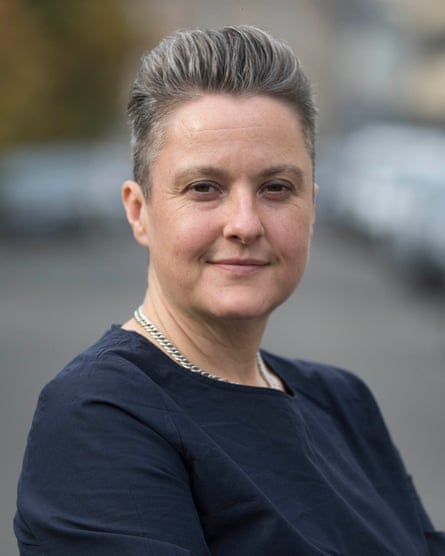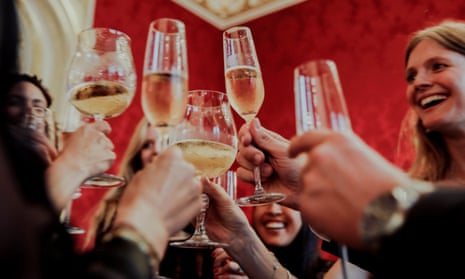Maggie Frerejean-Taittinger was well aware of the incongruities when she launched French Bloom in 2021. She had worked at gastronomy bible the Michelin Guide before marrying Rodolphe Frerejean-Taittinger, scion of the Taittinger champagne dynasty, and now here she was, launching an alcohol-free sparkling wine – in La Grand Épicerie de Paris at Le Bon Marché, one of the city’s most prestigious food halls.
“What a blasphemy to launch in wine country! We never considered France would be an important market for French Bloom,” she says. “But we were speechless at the reception. It exceeded all expectations: we sold over 10,000 bottles in the first three months.”
Since then, the global alcohol-free drinks market has soared, boosted in part by the “mindful drinking” and “sober curious” movements in recent years. But while beer was the undisputed winner of 2023 – accounting for 56% of the “nolo” market, with the leading brand, Guinness 0.0, seeing growth of 142% – wine has always been a harder market to crack. Can you really make a decent tasting no- or low-alcohol wine?
2024 should come with some answers, with experts predicting wine will be the new focus of nolo booze producers for the near future. This is due in part to a change in British law which now allows a drink with an ABV (alcohol by volume) lower than 8.5% to be labelled as wine rather than as a “wine-based drink”. But the main drive has been the great improvement in vinification.
Nolo wine is typically made using one of two processes – reverse osmosis and vacuum distillation – which often remove the aroma and body. The first attempts at 0% wine remedied this with lots of sugar and additives, but now processes have been refined and improved, an achievement reflected in sales. These sophisticated nolo drinks account for 13% of low ABV beverage sales. Wines are now being launched at every price point and for every occasion – from a celebration to a midweek tipple.
Wednesday’s Domaine, the name of the British entrepreneur Luke Hemsley’s brand, is a reference to keeping the midweek alcohol free. He founded the brand in 2021, and his red and white are based on de-alcoholised Spanish wines combined with natural flavours. He reports that sales have increased by 74% between the second and third quarter of 2023.
Hemsley says: “Demand is growing consistently throughout the year, breaking out of traditional nolo sales windows like Dry January. Consumption patterns are changing too, with more products bought in pubs and restaurants as choosing lower ABV options enters the mainstream.”

Laura Willoughby is founder of the mindful drinking community Club Soda, and runs a tasting room and shop offering a wide range of nolo beers, spirits and wine in Covent Garden, London. “Wine is our fastest selling category now,” she says. “Our customers had been scared off by the old supermarket own-brands, but the new wines are mainly from independent companies working directly with vineyards.
“The alcohol-free market is booming globally, and younger people are drinking less wine. So it makes sense for the wine world to take their knowhow and produce something exceptional that pairs with food – it has just taken a bit longer than beer as it is a different process.”
The time and financial investment should be well worth it, especially in hospitality. “KAM Media found that restaurants lose £800m a year by not upgrading diners from a tap water to something they pay for,” says Willoughby.
She cites Noughty as a label that has worked obsessively to find the right vineyard partners, and the French company Moderato, which launched in the UK this year, as one of the market’s innovators. Moderato developed a technique to enhance the aroma normally lost during de-alcoholisation. The result is the Le Blanc Moderato Cuvée Révolutionnaire, which launched this month with the promise of a nose of “exotic and white fruit aromas with hints of citrus zest”.
Frerejean-Taittinger says that she and her co-founder, Constance Jablonksi, spent two years on research and development and went through more than 70 iterations before they were happy with French Bloom’s Le Blanc and Le Rosé.
“The champagne process is the fruit of 400 years of R&D. With premium alcohol-free sparkling wines, although we use some of the same techniques, we are also developing a new knowhow, almost starting from scratch.”
Taittinger is not the only famous name entering the nolo wine market. In the mid-market, Freixenet and Jacob’s Creek have launched brand extensions, and the Provence vineyard Château La Coste also launches a premium 0% range next month, after three years’ R&D. The range – under the name Nooh By La Coste – is developed from its Rosé d’une Nuit cuvée. Nolo wine is quickly developing from a drink that is bearable to one that is a luxury.
“[We’re] offering a product that’s not only sophisticated but also promotes healthy, inclusive celebration,” says Frerejean-Taittinger. “This industry is like Silicon Valley, where innovation and disruption are the norms. Sobriety is being viewed more and more as a status symbol. It’s a shift not just about health or wellness; it’s a statement, a badge of honour.”
Our top three …
Eins Zwei Zero Rosé
(from £6.99, waitrosecellar.com; greatwine.co.uk)
From his base in Rüdesheim am Rhein, Johannes Leitz is one of Germany’s best, and most innovative, winemakers. So it’s no surprise he’s been ahead of the game with no-alcohol wines such as this pink-grapefruit tangy, crisp, bright rosé.
Dr Lo Alcohol-Free Sparkling Riesling NV
(from £10.99, thegeneralwine.co.uk; henningswine.co.uk)
Perhaps because they’re used to working with lower alcohol levels in many of their ‘normal’ wines, German winemakers have really taken to nolo. Here’s another top name from the country, Dr Loosen, with a sparkler that hits an authentic Sekt-like spot.
Zeno Alcohol-Liberated Red
(£9.99, Waitrose)
While many nolo wines are effectively side projects from conventional winemakers, Zeno, set up by an Englishman and Australian but sourcing here from Spain, has been a no-alcohol zone from the get-go, and this spicy, succulently berried, and properly tannin-filled red is among the most convincing nolo reds around.
David Williams, Observer wine critic

Comments (…)
Sign in or create your Guardian account to join the discussion